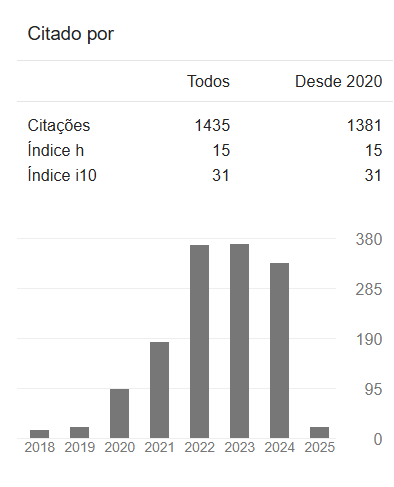WHAT'S IN THE RIVER, TEACHER? INVESTIGATIVE ACTIVITY ON MACROINVERTEBRATES IN HIGH SCHOOLS
DOI:
10.23926/RPD.2021.v6.n2.e035.id1048Keywords:
Research, Science teaching, Water qualityAbstract
This paper presents a qualitative study developed from the implementation of an Investigative Activity exploring the macroinvertebrate fauna in water sources with different levels of pollution. The data presented and discussed here were collected through audio recordings of the activities and the field diary of the researcher. Its analysis aimed to investigate how the use of an Investigative Activity can contribute to the improvement of science teaching. The results pointed out elements that indicate the contribution of the activity in the engagement and interest of students in the developed activities, in the same way that it helped in the understanding of the addressed contents.
Downloads
Metrics
References
AZEVEDO, Maria Cristina P. Stella. Ensino por investigação: problematizando as atividades em sala de aula. In: CARVALHO, Anna Maria Pessoa (Org.). Ensino de Ciências: unindo a pesquisa e a prática. São Paulo: Cengage Learning, 2009.
BOGDAN, Robert; BIKLEN, Sari. Investigação qualitativa em Educação: fundamentos, métodos e técnicas. Investigação qualitativa em educação. Portugal: Porto Editora, p. 15-80, 1994.
BYBEE, Rodger W. Scientific inquiry and science teaching. In: Scientific inquiry and nature of science. Springer, Dordrecht, 2006. p. 1-14. DOI: https://doi.org/10.1007/1-4020-2672-2_1
CALLISTO, Marco; FERREIRA, W; MORENO, P.; GOULART, M.; PETRUCIO, M. Aplicação de um protocolo de avaliação rápida da diversidade de habitats em atividade de ensino e pesquisa (MG-RJ). Acta Limnologica Brasiliensia, v. 14, n. 1, p. 91-98, 2002.
CARVALHO, Anna Maria Pessoa; VANNUCCHI. Andréia Infatosi; BARROS, Marcelo Alves; GONÇALVES, Maria Elisa Resende; REY, Renato Casal. Ciências no Ensino Fundamental: o conhecimento físico. São Paulo: Scipione, 2007.
CARVALHO, Anna Maria Pessoa. O ensino de ciências e a proposição de sequências de ensino investigativas. Ensino de ciências por investigação: condições para implementação em sala de aula. São Paulo: Cengage Learning, p. 1-20, 2013.
DRIVER, Rosalind; ASOKO, Hilary; LEACH, John; MORTIMER, Eduardo; Scott, Philip. Construindo conhecimento científico em sala de aula. Química nova na escola, n. 9, p. 31-40, 2000.
ENOS-BERLAGE, Jodi. Development of a water-quality lab that enhances learning & connects students to the land. The American Biology Teacher, v. 74, n. 7, p. 471-478, 2012. DOI: https://doi.org/10.1525/abt.2012.74.7.8
FREIRE, Paulo. Pedagogia do Oprimido. 17ª edição. Rio de Janeiro: Paz e Terra, p. 259-268, 1987.
FREITAS ZOMPERO, Andréia; LABURU, Carlos Eduardo. Significados de fotossíntese apropriados por alunos do ensino fundamental a partir de uma atividade investigativa mediada por multimodos de representação. Investigações em Ensino de Ciências, v. 16, n. 2, p. 179-199, 2016.
GODOY, Arilda Schmidt. Introdução à pesquisa qualitativa e suas possibilidades. RAE-Revista de Administração de Empresas, v. 35, n. 2, p. 57-63, 1995. DOI: https://doi.org/10.1590/S0034-75901995000200008
JAMES, Rebecca R.; OGDEN, Albert E.; DIVINCENZO, John P. A water quality study in Rutherford County, Tennessee: student group project. Journal of Natural Resources & Life Sciences Education, v. 35, n. 1, p. 118-126, 2006. DOI: https://doi.org/10.2134/jnrlse2006.0118
KOOSMANN, Angelena; BRUNS, Alex; ANTHONY, Sharon. The Chemistry of natural Waters. Science Education & Civic Engagement, p. 48, 2011.
MUGNAI, Riccardo; NESSIMIAN, Jorge Luiz; BAPTISTA, Darcilio Fernandes. Manual de identificação de macroinvertebrados aquáticos do Estado do Rio de Janeiro: para atividades técnicas, de ensino e treinamento em programas de avaliação da qualidade ecológica dos ecossistemas lóticos. Technical Books Editora, 2010.
NOVAK, Ann M.; TREAGUST, David F. Adjusting claims as new evidence emerges: Do students incorporate new evidence into their scientific explanations?. Journal of Research in Science Teaching, v. 55, n. 4, p. 526-549, 2018. DOI: https://doi.org/10.1002/tea.21429
PEDASTE, Margus; MÄEOTS, Mario; LEIJEN, Äli; SARAPUU, Tago. Improving students’ inquiry skills through reflection and self-regulation scaffolds. Technology, Instruction, Cognition and Learning, v. 9, n. 1-2, p. 81-95, 2015.
PUCHE, Helena; HOLT, Jame. Using scientific inquiry to teach students about water quality. The american biology Teacher, v. 74, n. 7, p. 503-508, 2012. DOI: https://doi.org/10.1525/abt.2012.74.7.13
SASSERON, Lúcia Helena; CARVALHO, Anna Maria Pessoa de. Construindo argumentação na sala de aula: a presença do ciclo argumentativo, os indicadores de alfabetização científica e o padrão de Toulmin. Ciência & Educação, v. 17, n. 1, p. 97-114, 2011. DOI: https://doi.org/10.1590/S1516-73132011000100007
WILHELM, Pascal; BEISHUIZEN, Jos Beishuizen. Content effects in self-directed inductive learning. Learning and Instruction, v. 13, n. 4, p. 381-402, 2003. DOI: https://doi.org/10.1016/S0959-4752(02)00013-0
Downloads
Published
How to Cite
Issue
Section
License
Copyright (c) 2023 A Revista Prática Docente tem o direito de primeira publicação

This work is licensed under a Creative Commons Attribution-NonCommercial 4.0 International License.
Authors who publish in this journal agree to the following terms:
- Authors retain the copyright and grant the journal the right of first publication, with the paper simultaneously licensed under the Licença Creative Commons Attribution allows the sharing of the work with acknowledgment of authorship and initial publication in this journal.
- Authors are authorized to take additional contracts separately, for non-exclusive distribution of the version of the work published in this journal (e.g. publish in institutional repository or as a book chapter), with acknowledgment of authorship and initial publication in this journal.











